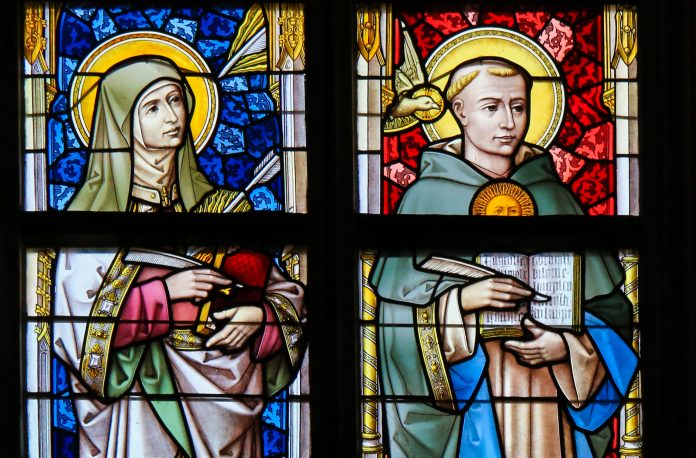
CARRIE SALLWASSER
“Saints preserve us!”
I suppose I’m showing my age when I admit that I’m familiar with the use of that acclamation. I know it means that we are asking the saints to save us from a particular incident or situation. But do we really want to be “preserved” just as we are right at that moment?
The Challenge of Saints
Saints shouldn’t keep us in our comfort zone. Rather, they are meant to challenge us, to lift us out of ourselves so that we more closely contemplate what it means to be Jesus’ disciples. If we ponder the lives of some recently canonized saints, what do they tell us about our ministry?
Saint Damien de Veuster of Moloka’i: If we think that a certain situation in life feels like exile at times, we need only reflect on Damien’s life. He willingly spent 16 years ministering to true exiles: people suffering leprosy who had been exiled to a colony in Hawaii. We would think that Hawaii would be paradise. Yet, isolation for the lepers transformed paradise into a place of pain.
In the same way, we might be inclined to believe that a financially sound parish would be a catechetical paradise, that there would be funds for new program materials and other resources. Yet, a parish may have financial stability but be isolated from the spirituality of the poor whom, Pope Francis tells us, have much to teach us (Evangelii gaudium, n. 198).
Damien allowed himself to be vulnerable and exposed himself to the disease from which he eventually died. As catechists, do we allow ourselves to be “infected” with the pain, suffering, isolation, and dysfunctionality of those to whom we minister? Or do we, like Damien, intimately unite ourselves to others and their situations?
Saint Kateri Tekakwitha: Saint Kateri was the daughter of a Mohawk chief in what is modern-day Canada. Baptized as an infant, Kateri grew up with a conviction and a call to chastity. Born a person of status, she became a non-person to her tribe through her adherence to her Catholic faith. She was shunned by her peers.
In the same way, our convictions sometimes cause frictions with others in our society. Are we willing to let go of the privileges of living as citizens of a first-world country in order to support and minister to the disenfranchised, the poor, the outcast? Do we tone down the message of gospel justice so as not to rock the boat that we share with our neighbors?
Saint John XXIII: Change is never easy. It takes trust and a deep willingness to step into the unknown. Saint John XIII knew that certain changes within the Church that would lead to renewal had to be inspired and supported by the Holy Spirit.
In the same way, we can be faced with the unknowns of change. We may sense that it is time to invite the Spirit in, but do we follow through on that inspiration? Or, out of fear and uncertainty, do we close our ears to the whispering of the Spirit? Does change frighten us into non-action, or does it invigorate us and offer new possibilities?
Saint John Paul II: One of the major hallmarks of St. John Paul II’s 27-year papacy was his willingness to travel and meet with people from all economic, political, and religious cultures. Such meetings were conducted with respect for others, focusing on common ground. Another hallmark was the phrase “Be not afraid.”
Like St. John Paul II, we encounter all kinds of families and households. Are our considerations for the needs of others centered on the differences between us? Do we find ourselves fearful when encountering others? Or do we consciously welcome those who are different or difficult? Can we, like St. John Paul II, trust in God’s presence and care?
The Reverence of the Saints
If you look at the lives of the saints, you will see one common thread: reverence for God in their views of the world. Because they first reverenced God, they could reverence others despite isolation, fear, doubt, abandonment, change, and distrust of the unfamiliar. The saints had the ability to see God in all things, even in the darkest nights of their souls.
We all know how easy it is to praise God when we have a full faculty of experienced catechists lined up for next year by the end of the present year. We can reverence God quite easily when parents are quick to volunteer and slow to criticize. God is obvious when our pastors support our role, respect our ministries, and honor our contracts. Sainthood is a piece of cake then.
But what about those times and circumstances in our ministry when we cannot readily see God? How do we reverence the divine when our faculty is sparse or discouraged? How do we reverence the parents who express disrespect for our best efforts? How do we reverence the pastors who cut our salaries and increase our responsibilities?
How? We remember the reverence of the saints. We remember that sainthood is not about our comfort zone. We remember that we were baptized to be saints. It is our vocation.
And let’s be joyful saints, and not the sour-faced individuals from whom St. Teresa of Ávila declared she wanted to be preserved!
Carrie Sallwasser has been a Coordinator of Religious Education in the Archdiocese of St. Louis for over 20 years.
This article origianlly appeared in Catechist magazine, February 2014.
Image Credit: Shutter Stock 544541167




